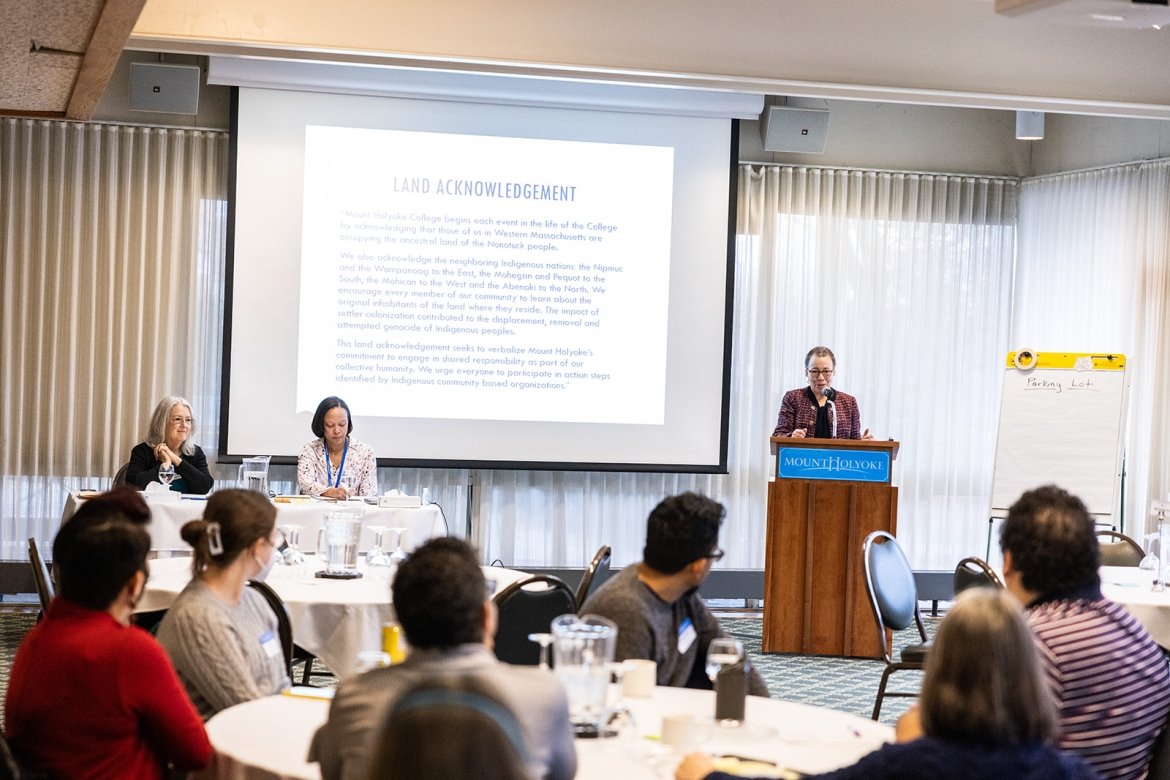Mount Holyoke College faculty and staff explore Intergroup Dialogue

A two-day Intergroup Dialogue workshop in mid-January provided 37 Mount Holyoke faculty and student life staff members with the opportunity to engage in cross-identity dialogue about race and other diversity-related issues.
A two-day workshop in mid-January provided 37 Mount Holyoke faculty and staff members from the Division of Student Life with the opportunity to engage in cross-identity dialogue about race and other diversity-related issues and to explore how to bring those conversations productively into classrooms and cocurricular settings.
The Intergroup Dialogue workshop, co-led by Presidential Fellow Kristie Ford, also aimed to introduce participants to approaches that can help students — and other members of the College community — hold conversations across the racial, gender, class and other challenging divides present in U.S. society.
Ford was assisted in leading the workshops by Sarah Goodwin, professor of English emerita and former Intergroup Dialogue faculty at Skidmore College. Intergroup Dialogue (IGD) is a nationally recognized, academic, credit-bearing program aimed at supporting student learning and competencies around inter- and intra-group relations, conflict and social justice across a range of social identities.
“Participating in IGD feels like a continuation of our journey toward becoming an anti-racist community.”
For Mount Holyoke, as for many other schools, the primary focus of IGD work to date has been on students. The move to also bring this kind of training to faculty and staff members represents an evolution in the College’s concentration on issues of diversity, equity and inclusion.
“As our campuses become more diverse, faculty and student life professionals often discuss the challenges of being attentive to the range of group dynamics that may play out across markers of difference like race, gender, nationality and ability status,” Ford said. “In addition, they often note feeling ill-equipped to handle tensions and conflict that may arise and worry about doing more harm than good if the intervention is not successful.”
Kicked off by remarks by Interim President Beverly Daniel Tatum, the two-day IGD workshop focused on providing participants with an intergroup dialogue experience. IGD is based on a scaffolded model of engagement and builds, across four stages, from lower- to higher-risk activities. These stages include building community; exploring social identities and their intersections in relation to power, privilege and inequality; engaging in difficult dialogues; and action planning.
For Lenore Reilly, senior lecturer in psychology and education, the workshop provided her with skills to work more effectively with her students. “Topics addressed in classes I teach often examine issues of diversity, equity and inclusion in K–12 education,” Reilly said. “Education is always a political act, and in the current political climate, having access to effective tools to navigate potentially polarizing topics seems more important than ever.”
Participant Jonencia Rivera Wood, assistant vice president for diversity, equity and inclusion, also found the workshop meaningful: “It highlighted why I appreciate being part of our Mount Holyoke College community. Participating in IGD feels like a continuation of our journey toward becoming an anti-racist community. I look forward to continuing to engage in this vital work, using IGD as a tool to build toward our shared anti-racist future.”
“From my perspective, it was a very successful workshop, with deep engagement from the participants,” said co-facilitator Dr. Sarah Goodwin. “I was impressed by how much the participants understood and embraced the process. Almost all colleges are experiencing similar stresses and strains. Based on my experiences on other campuses, I would say that Mount Holyoke faculty and staff are already making great progress — realizing, again, that the work is messy and always unfinished.”
A follow-up workshop will be offered to participants who completed the January session. The second workshop, offered either this March or May, will present the specific skills necessary to facilitate intergroup dialogues.
“This is ever-evolving, life-long work,” Ford said. “Despite the educational expertise and training that has brought us to our respective roles on campus, I believe we have to approach issues related to equity and justice with a sense of humility, knowing that we will make mistakes, while continually striving to do better. Releasing our sense of being an ‘expert’ can feel terrifying as well as freeing.”